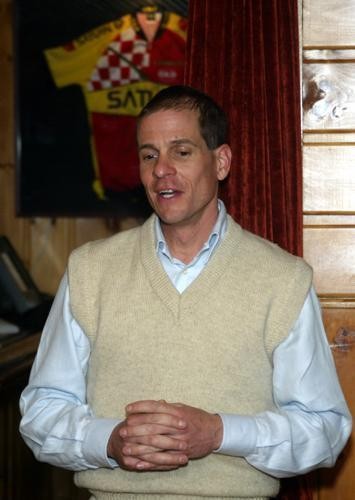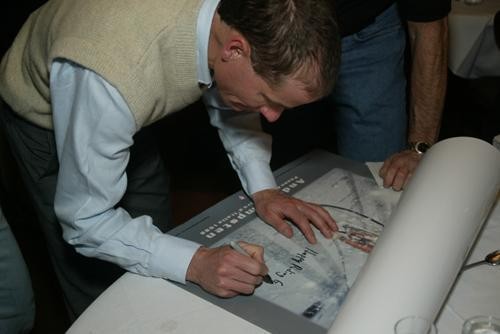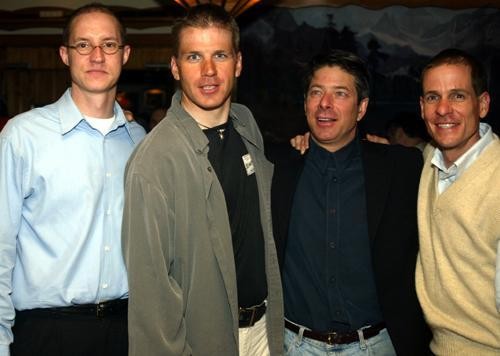The State of the Union
Cyclingnews: What are your thoughts on where U.S. cycling is today, particularly compared to when...



An interview with Andy Hampsten, February 20, 2004
U.S. cycling legend and 1988 Giro d'Italia winner Andy Hampsten returned to one of the smaller roots of his cycling career last weekend to attend the "Save the Track" benefit for the Ed Rudolph Velodrome in Northbrook, Ill. Before the dinner began, Andy sat down with Mark Zalewski to chat about his thoughts on the current state of cycling in the United States.
Despite being long retired as a racer, Hampsten is still very much involved with cycling, running Cinghiale cycle tours in Tuscany and designing Hampsten Cycles bikes in partnership with his brother Steve. Splitting his time between his home in Boulder and working home in Tuscany, Hampsten sees many different angles of cycling.
Cyclingnews: What are your thoughts on where U.S. cycling is today, particularly compared to when you began competing?
Andy Hampsten: It's exciting! Looking at the pro ranks, it's obviously dead-thrilling to see Lance and the Postal team dominating the tour. But other riders like Tyler Hamilton have me really excited. I hate to predict that this year's tour will be better than last years, but I think it might be. I think Tyler's done a really good move with Phonak -- I think he'll surprise quite a few people -- though I know quite a few people believe in him already. There are good pros on other teams too.
On the grass roots level, it never looks [quite as] bright -- there aren't as many junior races going on, but that can change over night. I mean look at Tom Danielson -- who knows, in a few years he may be the only one we are talking about.
CN: Tom Danielson is one of a growing list of American riders that are moving to the top European teams. You were one of the trailblazers in this aspect. What advice do you have for them and others who aspire for that?
The latest race content, interviews, features, reviews and expert buying guides, direct to your inbox!
AH: I think he did a really good move! I talked to Tom a little bit last year, and I said go ahead and jump in with both feet on a team that is going to take care of you. He has a real tough director, but I think Ferretti is going to respect him enough (probably baby him a little bit for his first year), but I think it is going to be great. It's normal for riders to move on and try something else. And I think going to Italy, especially with such a good team -- I mean they have Petacchi setting the world on fire, and that is a really good atmosphere for a GC rider like Danielson to develop in -- it's a brilliant move.
Obviously, U.S. Postal is one of the best teams in the world and an obvious objective for many American riders, but I think there is something to be said for going on a foreign team -- it takes more dedication, and it's a little more the school of hard knocks, but it is going to teach him not only to survive but what it takes to captain a team.
CN: What do you think the effects will be for such a dominating team like Saturn leave the U.S. peloton?
AH: It's really hard on us fans to see a great team like Saturn, who have done so much for their riders with Tom Schuler, leave the sport. It was sad when Motorola stopped doing it, but you know eight to ten years is a really good life for a cycling team. Part of it is they get so big and so successful for [one] company that another company has a hard time jumping in and being known as the "ex-Saturn team."
It's hard to see all those people and riders dispersing, and some of them have a hard time finding a job, but it opens up a lot of other room. The racing scene is going to be really good [because of that.] And the cool thing about that for the racers is that it brings a lot of focus from Europe to America -- you do well on Saturn, the door is always open in Europe if you want it bad enough.
CN: A few years ago, Navigators made the jump across the pond to try their hand in the European peloton, albeit on a limited level. Though they showed they could hang with the other teams, their presence wasn't exactly as huge as Postal. Nonetheless, they are continuing this year to try to make a name for themselves in Europe. Is this what the larger domestic teams need to be doing to develop cycling in the U.S.?
AH: It is so hard for a team to make that jump. I can see it easier for one rider, but not for an entire team. The whole mechanics, infrastructure and support -- it just takes tons of money [laughs]! It is so hard to take a team over to Europe. But it has worked -- I was with U.S. Postal in 1996 when we first came over to Europe, and obviously they went places and I think they are a big inspiration to a lot of these teams. But it is not completely necessary -- there are a lot of races over here like the Tour of Georgia, and a lot of other things going on -- a team can get enough publicity racing here being a part of the calendar.
It's a big step over to Europe, and hats off to any team that goes over to Europe for even a few weeks or months -- like Navigators tearing it up at Gent-Wevelghem -- that was a huge result for a small, on an international scale, American team.
CN: There also seems to be a recent a tendency for a lot of top U.S. amateur teams to try to make the jump to the domestic pro ranks, with limited success and a short life. Do you think that is part of the process, or should these teams be focused on developing riders to move to the already established pro teams?
AH: America is fairly unique in that pros and amateurs can kind of jump around between each other fairly well -- which is good because it gives people exposure. But after so many years in this sport I have to say that much of it is just luck! [laughs] My whole career was based on being born at the right time -- there was a good junior program when I was young, as an amateur I was able to race with the amateur cycling federation in Europe and in my mid-twenties I was able to turn pro and ride the 7-Eleven and Motorola crest all the way through the end of my career. Looking at what a kid would have to do to do that today... it's hard.
I don't want to say it's bad for an amateur team to bite off more than they can chew, but at the same time it is good for them to get in it with the pros -- you'll get chewed up and spit out in the first races, Lance did too -- but it is really good to keep that contact between what might seem like small races in America compared to Europe. It is still just bike racing.
CN: Are races like the Tour of Georgia and the former Tour DuPont crucial to developing cycling in the U.S.?
AH: I think so. It's a big event and you start hearing a buzz like, "Maybe Lance will show up!" and it will get all the little kids lining the roads. They are going to do it anyway because it is a great event. When we talk grass roots, obviously we want a lot of juniors to be racing and a healthy amateur scene, but as important or more important is having a bunch of eight year-old kids out there dreaming and getting hooked. Maybe they dragged along by mom and dad and get hooked.
We also have to realize that it is never going to be a huge sport [here]. Lance is huge -- he is a superstar in American life, but bike racing is never going to be the NBA, and it doesn't need to be. But the more people, the more teams, the more races going on, the more kids starting it, the healthier our cycling future will be.
CN: What do you think needs to be done to get younger riders interested in the sport here?
AH: I don't have an inside look at it, but is a problem -- there aren't a lot of kids racing. Cycling isn't a "mainstream" sport, and it's hard to get kids to do a really tough sport and convince them it is fun! [laughs] When I started my friends and I found it haphazardly, which helped because we focused on it as our own little sport. I wish I knew the answer [to getting kids involved.]
CN: What is your reaction to the U.S. performance at the World Championships?
AH: [World's] is always hit-and-miss. I did a dozen Worlds in my career -- LeMond would sometimes be there, and sometimes we would do well, sometimes we wouldn't. Having it in October is just so hard. You look at all the Postal guys, and the best ones are focused on Lance. Being ready for July and then looking to October is just too hard.
CN: What do you predict for le Tour next year?
AH: I'd say Lance has about a 60-70 percent chance of winning. I mean if he is firing on all cylinders, he'll win for sure. But I think last year he was in super form and he had a hard time. I don't think anything bad happened to him, or bad luck, it's just hard to win. He is brilliant tactically and he has the most incredible team -- they won the team time trial with three "pure" climbers, which shows just how phenomenal the team is! They are insanely good.
Lance is Superman, but I could see someone like Tyler being on form and being able to give it a shot. There are always "ifs," but you look at Telekom last year, Vinokourov did an amazing ride, but they didn't have the team. It's going to be an incredible race!
And with that, Andy joined the growing party, shaking hands, meeting fans and telling stories of his thrilling professional career.
